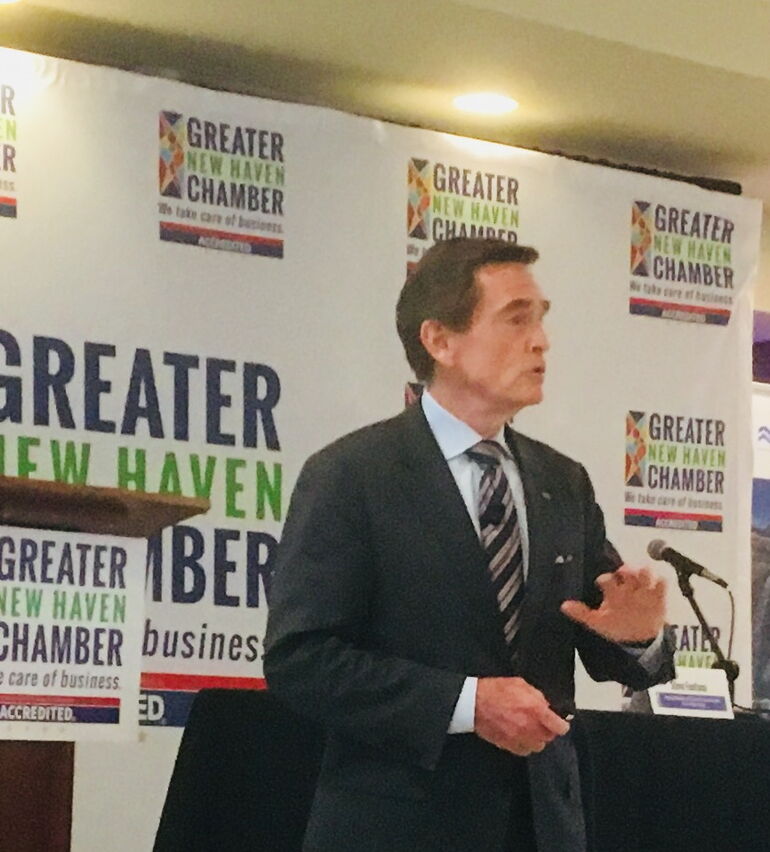Processing Your Payment
Please do not leave this page until complete. This can take a few moments.
-
News
-
Editions
-
- Lists
-
Viewpoints
-
HBJ Events
-
Event Info
- 2024 Economic Outlook Webinar Presented by: NBT Bank
- Best Places to Work in Connecticut 2024
- Top 25 Women In Business Awards 2024
- Connecticut's Family Business Awards 2024
- What's Your Story? A Small Business Giveaway 2024 Presented By: Torrington Savings Bank
- 40 Under Forty Awards 2024
- C-Suite and Lifetime Achievement Awards 2024
- Connecticut's Health Care Heroes Awards 2024
-
-
Business Calendar
-
Custom Content
- News
-
Editions
View Digital Editions
Biweekly Issues
- April 15, 2024
- April 1, 2024
- March 18, 2024
- March 4, 2024
- February 19, 2024
- February 5, 2024
- January 22, 2024
- January 8, 2024
- Dec. 11, 2023
- + More
Special Editions
- Lists
- Viewpoints
-
HBJ Events
Event Info
- View all Events
- 2024 Economic Outlook Webinar Presented by: NBT Bank
- Best Places to Work in Connecticut 2024
- Top 25 Women In Business Awards 2024
- Connecticut's Family Business Awards 2024
- What's Your Story? A Small Business Giveaway 2024 Presented By: Torrington Savings Bank
- 40 Under Forty Awards 2024
- C-Suite and Lifetime Achievement Awards 2024
- Connecticut's Health Care Heroes Awards 2024
Award Honorees
- Business Calendar
- Custom Content
CERC’s Smith: Better Ned than dead
 PHOTO | New Haven Biz
From critic to cheerleader: Jim Smith at Woodwinds Wednesday.
PHOTO | New Haven Biz
From critic to cheerleader: Jim Smith at Woodwinds Wednesday.
During the same week that state lawmakers voted to raise Connecticut’s minimum wage to $15 an hour — a measure widely viewed as anathema by the business community — one of the state’s most respected business leaders told peers it was too soon to pass judgment on the brief but portentous administration of Gov. Ned Lamont.
“I absolutely believe Connecticut has a bright future,” James C. Smith told an audience of some 250 professionals at the Greater New Haven Chamber of Commerce’s 2019 Real Estate & Construction Forecast event Wednesday at Woodwinds in Branford. Despite the state’s seemingly intractable fiscal woes, “the governor understands the issues, and he’s a great leader,” Smith said.
Smith is chairman and former CEO of Waterbury-based Webster Financial Corp., the company founded by his father, Harold Webster Smith, during the Great Depression. Earlier this year he was tapped by Lamont to co-chair (with Yale’s Indra Nooyi) the Connecticut Economic Resource Center (CERC), which Lamont has repurposed as an appendage of something called the Partnership to Advance the Connecticut of Tomorrow (PACT). Smith called the new CERC a “business-driven” initiative that has been “redirected to focus on business retention, expansion and recruitment.”
Easier said than done in the current business climate. But Smith defended the new administration, and described what he said were Lamont’s “three pillars for economic growth: fiscal stability; “investments” in transportation and workforce development; and business recruitment, expansion and retention.
Before the November election Smith co-chaired (with Robert Patricelli) the Connecticut Commission on Fiscal Stability & Economic Growth, a group of 14 business leaders. That group issued a report in March 2018 (with a “2.0” revision released in November) that prescribed some stiff medicine to address the state’s fiscal ills, including a $4 billion budget deficit, by slashing $1 billion in spending (including public-employee pension payouts) and without raising taxes. “We wanted people to know that the [state’s fiscal] platform was on fire,” Smith explained.
Opposed by politically potent public-employee unions, that plan predictably went nowhere.
So now Smith is back in a new role, and with a new message: Lamont is not the enemy of Connecticut’s business community.
Lamont, Smith said, “is a businessperson -- just like us. And we haven’t had a businessperson as governor in a very long time. “I know [business] people say, ‘We don’t like the [$15] minimum wage, we don’t like [paid] family medical leave — and I don’t like some of those things also,” Smith said. “But I think in looking at the big picture that we can count on [Lamont] to be there to either temper [unpopular policies and legislation] or represent our interests, and to be persuasive, when he can, with the legislature.”
Business leaders, Smith said, “have to be willing to face the brutal facts of our current reality while never losing faith in our ability to overcome our challenges.”
Among those challenges is the state’s transportation infrastructure. Smith said Connecticut needs to invest in its highways and rail system to remain competitive with neighboring states. To do that will require anywhere from $700 million to $1 billion a year, he said, money that will have to come from somewhere.
“Transportation is messy,” Smith said. “But one thing is sure: There is going to be another source of revenue, a dedicated stream — whether that’s in tolls or bonding. So I hope we can all buy into the notion that additional funding for transportation is a good thing.”
As is workforce development — the third leg of Lamont’s economic-development tripod.
“If we did a better job of business development and [made] better economic-development choices in Connecticut, even if we don’t achieve fiscal stability right off the bat, we could boost our growth rate,” Smith said.
Lamont, Smith said, “is very pragmatic, he’s open-minded, he’s not ideologically hidebound. He wants to find out what the best solution is.”
And perhaps he will.
“There seems to be a growing belief, even within the business community, that if we pull together we can achieve outstanding results,” Smith said.
Contact Michael C. Bingham at mbingham@newhavenbiz.com

2022 Giving Guide
This special edition informs and connects businesses with nonprofit organizations that are aligned with what they care about. Each nonprofit profile provides a crisp snapshot of the organization’s mission, goals, area of service, giving and volunteer opportunities and board leadership.
Learn more
Subscribe
Hartford Business Journal provides the top coverage of news, trends, data, politics and personalities of the area’s business community. Get the news and information you need from the award-winning writers at HBJ. Don’t miss out - subscribe today.
Subscribe
2024 Book of Lists
Delivering Vital Marketplace Content and Context to Senior Decision Makers Throughout Greater Hartford and the State ... All Year Long!
Read Here-
2022 Giving Guide
This special edition informs and connects businesses with nonprofit organizations that are aligned with what they care about. Each nonprofit profile provides a crisp snapshot of the organization’s mission, goals, area of service, giving and volunteer opportunities and board leadership.
-
Subscribe
Hartford Business Journal provides the top coverage of news, trends, data, politics and personalities of the area’s business community. Get the news and information you need from the award-winning writers at HBJ. Don’t miss out - subscribe today.
-
2024 Book of Lists
Delivering Vital Marketplace Content and Context to Senior Decision Makers Throughout Greater Hartford and the State ... All Year Long!
ABOUT
ADVERTISE
NEW ENGLAND BUSINESS MEDIA SITES
No articles left
Get access now
In order to use this feature, we need some information from you. You can also login or register for a free account.
By clicking submit you are agreeing to our cookie usage and Privacy Policy
Already have an account? Login
Already have an account? Login
Want to create an account? Register
Get access now
In order to use this feature, we need some information from you. You can also login or register for a free account.
By clicking submit you are agreeing to our cookie usage and Privacy Policy
Already have an account? Login
Already have an account? Login
Want to create an account? Register






0 Comments